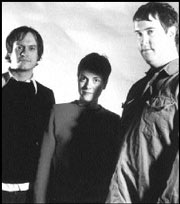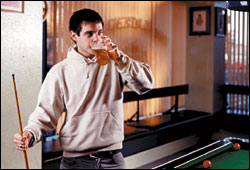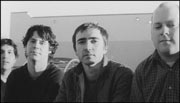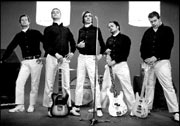764-HERO
Bumbershoot, EMP, Sky Church, $20
9:30 p.m. Fri., Aug. 30
Call it the seven-year itch. Together since 1995, locally beloved, nationally lauded 764-HERO announced last week that they were finally, amicably calling it quits. While many of their contemporaries fell by the wayside or got lost in commercial excess, HERO stayed on an even keel, producing album after album of charmingly angular rock, a sound that was eventually branded with the unshakable “Northwest emo” and “rainy day indie” tags. Lead singer/guitarist John Atkins talked to the Weekly about the band’s past, his plans for the future, and the positive points of the pizza business.
Seattle Weekly: So the question people always ask about the band—at least every music journalist asks—is where you got your name? You’ll never have to answer it again.
John Atkins: Yeah. But now people, in national publications or whatever, phrase the answer in the question, like [thoughtful journalist voice] “So you got your name from a car-pool violators’ sign in Seattle.” It’s like, “Is there a question mark at the end of that?” Actually the name was a default, because we had a show before we had a name, and someone said “How about that?” and we were like, “OK.” This guy, Jeff, had gone to college in Santa Cruz, and while he was down there, some girl started a band but they didn’t have a name, and he was like, “764-HERO, cuz no one will even get it down here.” And they actually played a couple shows. And then he came up here, and I was working at a pizza place, and he gave it to me. And then we were playing Santa Cruz later that year, and these girls were like, “We were in that band!”
Tell us about your first show.
We opened for Juned at the Crocodile. There was only a handful of people, but we had the fact that I worked at a pizza place on our side. Actually, I think that because Leslie [Hardy, of Hole and the Murder City Devils], who was in Juned, worked at the same place, World Pizza, they closed for the night, because two of their employees were playing. It was like, ‘Hey, let’s all go down there.’ So we had that on our side. We played the Crocodile a lot at first; Moe’s, the Weathered Wall—that whole era.
And what about your worst show ever?
There’s been a fair share of shows on tour, like the first time we played in North Carolina—every band has this kind of story—there were two people there, and then they left when we started playing. It was one of those ones where the bartenders and the other band on the bill aren’t even watching. . . . And my friend, Kyle, who I grew up with on Mercer Island, was living in Chicago and decided to meet us for part of that tour, so he flew into North Carolina, and that was his big “Oh, so you’re in a band” introduction. Glamorous!
So, what about the reasons for the breakup?
We were starting to plan what was coming next—for the next tour and recording. Me and [bandmate] Polly [Johnson-Dickinson] were having tofu teriyaki and talking, and somehow the smallest hint of “What are we doing?” came out. And all of a sudden we realized that we were kind of talking about [breaking up].
Neither of us came to the table with it—it wasn’t like we were having a problem with each other or anything. It was just sort of like, “Maybe we should do a shorter tour,” which led to us to ask, “Why are we saying that?” You know, if you start talking about that—we’d never talked that way before—maybe you shouldn’t be doing it anymore.
We’ve never regretted anything we’ve done, and we want to make sure that it stayed that way. So we decided that maybe it was time, which was the hardest decision to make, because it would be easier to just keep going. And it would still be fun, but at a certain point it has to come to an end. Plus, you know, Polly wanted to go to school, and doing two or three major tours a year for seven years, plus blocking out the time for making a record and coming up with songs and playing locally, there is a certain amount of sacrifice that it takes—not that we feel like we sacrificed, but you can’t go to school, and you can’t have a job that, you know, isn’t in the pizza industry. I feel good about everything we’ve done. We had a good run of it. But it’s still a total bummer. It would have killed me if it had been because of a fight, or if we’d made a crappy record—if it took a crappy record for us to have that conversation over tofu teriyaki later—but we hopefully had the foresight to not do that.
Do you feel like Bumbershoot is the ideal way to go out?
It’s a safe way. On one hand, it would be cool to do it at a club and have a big party and stuff, but on the other hand, Bumbershoot is kind of a neutral zone. That’s cool. I hope we can just play and have fun, because it’s going to be hard enough just getting there [laughs].
You and Spencer Moody have the John and Spencer Booze Explosion EP coming out (due in the fall from Tiger Style Records). But what about more serious musical plans? What’s next for you?
I think the next step is just for me to stay open. When Hush Harbor [Atkins’ band in the early ’90s] broke up, I just started four-tracking without knowing what I was going to do, and then all of the sudden me and Polly started playing together. So, who knows? I am open to anything.









